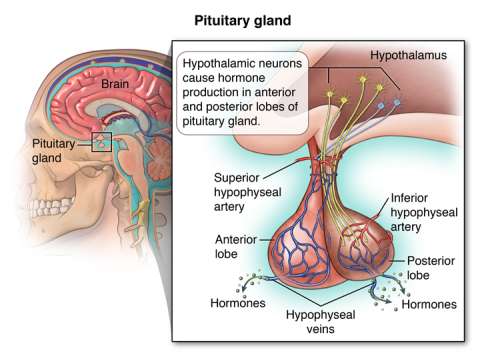Pituitary Tumor
Find your care
We deliver effective, minimally invasive treatments in a caring environment. Call 310-267-7838 to connect with an expert in endocrine surgery.
Pituitary Tumor: Symptoms, Treatment, Diagnosis

What is a pituitary gland tumor?
A pituitary tumor is an abnormal growth in the pituitary gland, the part of the brain that regulates the body's balance of hormones. Alternative Names: Tumor - pituitary
Causes, incidence, and risk factors
The pituitary gland is a pea-sized endocrine gland located at the base of the brain. The pituitary regulates and controls the secretion of hormones from other endocrine glands, which in turn regulate many body processes. These hormones include the following:
- Growth hormone (GH)
- Thyroid-stimulating hormone (TSH)
- Adrenocorticotrophic hormone (ACTH)
- Prolactin
About 75% of pituitary tumors secrete hormones. When a tumor produces excessive amounts of one or more hormones, the following conditions may occur:
- Giantism or acromegaly (excess growth hormone)
- Hyperthyroidism (excess thyroid stimulating hormone)
- Cushing's syndrome (excess adrenocorticotropic hormone)
- Prolactinoma (excess prolactin)
As the pituitary gland tumor grows, destruction of some of the hormone-secreting cells of the pituitary may take place, causing symptoms related to the underproduction of the hormone that is suppressed (hypopituitarism). The causes of pituitary tumors are unknown, although some are a part of a hereditary disorder called multiple endocrine neoplasia I (MEN I). There are other types of tumors that can be found in the same area of the head as a pituitary tumor:
- Craniopharyngiomas
- Germinomas
- Cysts
- Metastatic tumors (tumors that have spread from cancer in another part of the body)
About 15% of tumors located within the skull are pituitary tumors. Most pituitary tumors are in the anterior pituitary lobe and are usually benign (noncancerous). Pituitary tumors develop in 1 in 10,000 people.
Symptoms
Because the pituitary gland controls the production of hormones throughout the body, pituitary disorders resemble other endocrine disorders and have a broad range of symptoms. Symptoms depend on the type and location of the tumor and cause hormone excess, hormone deficiency, or pressure on the brain and central nervous system. Some tumors cause excess hormone production while others cause a deficiency, so one type of tumor may produce symptoms that are very different from those produced by another type of growth (for example, one may cause hair growth while the other causes hair loss).
The same tumor may begin by causing the release of excess hormone and then later result in a deficiency of that hormone as normal pituitary cells are suppressed. This would cause early pituitary tumor symptoms that appear to be the opposite of later symptoms. Some of the many symptoms associated with pituitary tumors include the following:
- Headache
- Visual changes
- Double vision
- Drooping eyelids
- Personality changes
- Decreased sexual interest
- Irritability
- Seizures
- Nasal drainage
- Skin changes
- Thickened skin
- Enlarged sebaceous glands
- Facial changes
- Moon face, puffy eyes
- Enlarged jaw and facial bones
- Hair changes
- Loss of body hair
- Coarse, thin head hair
- Thinning of eyebrows
- Weakness
- Lethargy
- Temperature sensitivity
- Intolerance to cold
- Intolerance to heat
- Constipation
- Nausea and vomiting
- Low blood pressure
- Impaired sense of smell
- Changes in weight
- Weight loss (unintentional)
- Weight gain (unintentional)
In women:
- Cessation of menses
- Abnormal nipple discharge
- Excessive body hair
In men:
- Breast development
- Impotence
Pituitary Gland Tumor Signs and Tests
Your health care provider will perform a physical examination and will note any double vision and visual field deficits, such as loss of peripheral vision or the ability to see in certain areas. Tests that help confirm the diagnosis include the following:
- MRI of head
- Cranial CT scan
- Formal visual field testing
Endocrine function tests include the following:
Cortisol levels:
- Urine cortisol test
- Dexamethasone suppression test - serum cortisol levels measured after giving dexamethasone to suppress hormonal secretion
- Saliva cortisol test
- Insulin growth factor-1 (IGF-1) levels
Thyroid hormone levels:
- TSH test
- Free T4 test
- Serum prolactin levels
- Testosterone/estradiol levels
- Luteinizing hormone (LH) levels
- Follicular stimulating hormone (FSH) levels
Treatment
How serious is a pituitary tumor? Pituitary gland tumors are usually not cancerous and therefore won't spread to other areas of the body. However, they can cause serious problems by putting pressure on the brain. Surgical removal is often necessary, particularly if the tumor is pressing on the optic nerves, which could cause blindness. Most of the time, pituitary tumors can be removed through a transsphenoidal procedure - where the surgeon accesses the tumor through your nose and sinuses. However, some tumors cannot be removed this way and will require transcranial (through the skull) removal.
Radiation therapy may be used to shrink the tumor, either in combination with surgery or for people who cannot undergo surgery. Medications may shrink certain types of tumors:
- Bromocriptine or cabergoline are the first-line therapy for tumors that secrete prolactin. These drugs decrease prolactin levels and shrink the tumor.
- Somatostatin analogs are sometimes used for tumors that secrete growth hormone, particularly when surgery is unlikely to result in a cure.
Expectations (prognosis):
If the tumor can be surgically removed, the probable outcome is fair to good, depending upon whether the entire tumor was removed.
Complications:
The most serious complication is blindness, which can occur if the optic nerve is seriously damaged. Permanent hormonal imbalances may be caused by the tumor or its removal. This may require replacement of the affected hormones.
Calling your health care provider:
Call your health care provider if you develop any pituitary tumor symptoms.